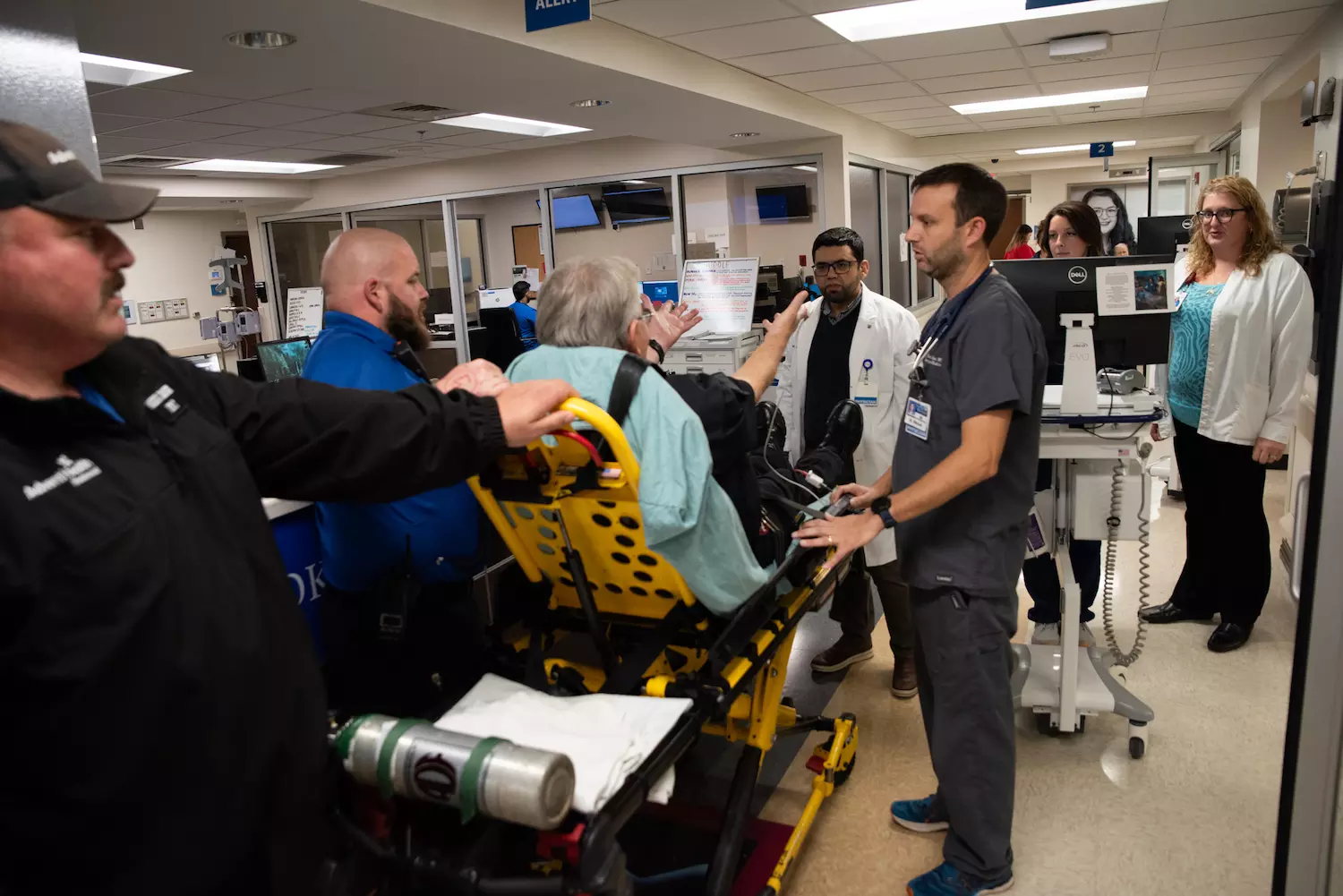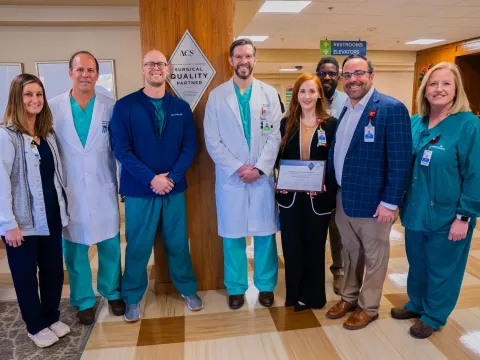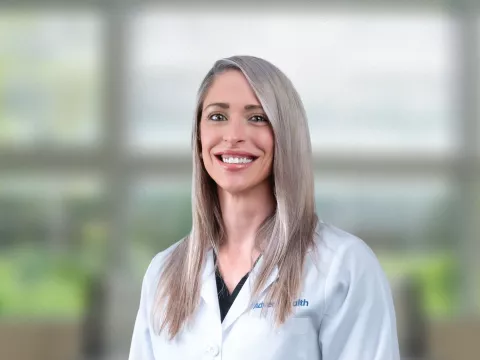- AdventHealth
Choose the health content that’s right for you, and get it delivered right in your inbox.

Cartersville resident Bobby Wilkins was driving home from town when he felt an all-to-familiar tingle come over the left side of his body. Nearing his house, Wilkins called his son and told him to take him to the hospital immediately.
Wilkins had experienced two strokes prior, one of which led to a years-long recovery process in which he had to learn how to walk and talk again. As a retired firefighter and Georgia Power lineman, Wilkins spent his career helping and rescuing others. Now, he was at the mercy of doctors, physical therapists and his care team to help him in his medical crisis.
Fortunately, his son’s quick response in driving Wilkins to AdventHealth Redmond prevented his third stroke from drastically impacting his life.
When Wilkins arrived at the emergency department, a code stroke was called over the loudspeaker and within seconds, Wilkins was taken back to the “stroke box,” and assessed by the stroke team. The idea behind the stroke box, or stroke triage area, said AdventHealth Redmond stroke coordinator, Melody Wright, RN, BSN, is to give patients a streamlined process to describe their symptoms once during an initial exam. After the team is finished with the assessment, they jump into action and transport the patient to imaging to confirm if the patient is having a stroke and identify the type of stroke, which informs the next step in treatment.
With a stroke, said Wright, every minute counts. Each second, a person experiencing a stroke loses 500 billion neurons in the brain. The stroke team at AdventHealth Redmond delivers faster care than national standards. Since adding the stroke box four years ago, Wright has observed treatment times have improved significantly.
AdventHealth Redmond has earned stroke accreditation from The Joint Commission as a Certified Advanced Primary Stroke Center and has received the American Heart Association’s Target: Stroke Honor Role Elite Plus Award.
Earlier this year, the stroke team added perfusion scans of the brain to improve the diagnostic capability for stroke care. A computed tomography perfusion (CTP) scan of the brain enables the care team to determine how much of the penumbra is salvageable during an acute stroke. The penumbra is the area of the brain that can possibly be saved during an acute ischemic stroke.
“A CTP enables faster clinical decisions by helping our stroke team quickly assess salvageable brain tissue and identify patients who are likely to benefit from clot retrieval,” said Wright.
Family and friends of middle and elderly people should familiarize themselves with signs and symptoms of a stroke by using the B.E. F.A.S.T. acronym. This stands for:
Balance: Does the person have trouble with balance, coordination or dizziness?
Eyes: Is the person experiencing sudden blurring or loss of vision in one or both eyes?
Face: When the person smiles, does one side of the face droop?
Arms: Does the person have arm or leg weakness?
Speech: Is the person’s speech slurred? Can they repeat a simple sentence?
Time: If the person has any of these symptoms, call 911 immediately.
Wright also advised, “If you are headed to the hospital with a suspected stroke, give the name of a family member or friend who witnessed the stroke event to the ambulance. Make sure to bring all medications or list of medications with you to the hospital.”
Neurologist Muhammad Ahmed, MD, says AdventHealth Redmond’s proven standard of care is what impressed him initially about its stroke program.
“This hospital goes above and beyond what the guidelines ask for,” said Dr. Ahmed. “We are trying to attain the same standard of care of tertiary, larger stroke centers. We have all the staff, facilities and specialties to offer neurological care for stroke patients.”
Dr. Ahmed is encouraged by outcomes of patients who seek help immediately. He and his team work together to help patients recover to reach their previous levels of activity.
For Wilkins, this hope is becoming reality for him. Each day, Wilkins said, he continues to see progress. His positive attitude and commitment to his recovery is essential. He credits the inpatient rehabilitation team with motivating and encouraging him during his stay at AdventHealth Redmond. Wilkins says he hopes to share this inspiration with others who have experienced a stroke and are feeling discouraged.
“I enjoy talking to people who are facing the impacts of a stroke. Most people give up. You can’t give up. You can do anything that you want to do. Your attitude and determination have a lot to do with it. If you sit down and say, ‘I can’t,’ you’re not going to get anywhere,” said Wilkins.
Recent News
AdventHealth Redmond is proud to announce its recognition as the #4 medium-sized hospital in Georgia by Georgia Trend magazine. This prestigious ranking highlights AdventHealth Redmond's commitment to...
AdventHealth Redmond is proud to announce the recipients of the 2024 EMS Service Awards, recognizing the dedicated EMS professionals' outstanding contributions and exceptional service. These awards...
AdventHealth Redmond announced that it has received accreditation under the Metabolic and Bariatric Surgery Accreditation and Quality Improvement Program (MBSAQIP), a joint quality program of the...
AdventHealth Redmond is hosting the AngioScreen bus from 8 am to 3 pm, Monday, Dec. 9. The AngioScreen bus will be parked in front of the main entrance of AdventHealth Redmond. An AngioScreen is a...
As a high school senior, Daniela Villela-Martinez found herself at a crossroads, uncertain about her career path and unsure how to navigate the challenges of being a first-generation college student...
AdventHealth Redmond is proud to announce that its Antibiotic Stewardship Program (ASP) has been awarded platinum level status in the Georgia Department of Public Health’s Antibiotic Stewardship...
AdventHealth Redmond celebrated the season of gratitude by hosting its annual Thanksgiving meal for team members, honoring their dedication and commitment to delivering exceptional care.
AdventHealth Medical Group is pleased to announce that Lauren Rader, ACNPC-AG, CPAN, RNFA, has joined AdventHealth Medical Group Neurosurgery at Rome.
Rader joins John A. Cowan, Jr., MD, FAANS; Jason...
AdventHealth Redmond is proud to support the LIVESTRONG at the YMCA program in Rome, empowering cancer survivors on their journey to improved health and strength.
AdventHealth Medical Group is pleased to announce that Jose Marino, MD, has joined AdventHealth Medical Group Interventional Neurology at Rome.
Dr. Marino is an interventional and vascular neurologist...
“I care for you like family,” reads the heart badge of health care veteran Melissa Cromer. Team member Cromer is grateful for the rewarding opportunity to work with patients and their families after...
We're excited to share the November edition of Northwest Georgia Health News! This episode celebrates our commitment to exceptional health care in our region by extending the healing ministry of...












